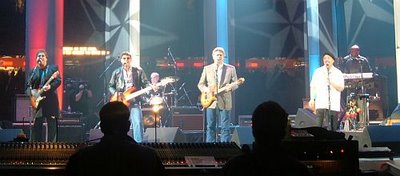Since the art of telling stories is so essential for the articulation of
almost anything that is communicated, I thought I'd bring forward the continued inspiration for
new creative inventions that I get from the field of screenwriting. What
fascinates me about screenwriting is how it is the art of selecting what
is relevant to a story that "drives" the plot line forward - and of
course, what is left out as extraneous. For this reason, I'm always
curious to look at movies that are inspired by much longer and more
detailed books to bring forward this selection process, scene by scene.
One point that's not obviously revealed by merely watching movies is how
movie viewers have been educated over the years to figure out what is
happening in a story. Viewers are shown what has been determined by
producers to be relevant to the story in the scene action of the actors,
set and events. Of course this also includes indications of time
frames, foreshadowing of later events, suspense, drama, character
building, etc. Movie watchers are, to a great extent, completely unaware
of how much work they are doing to construct the plot, events and
characters as a story unfolds - and good storytelling never disturbs the
illusion of how a viewer must continue to be tracking these elements to
make sense of the illusion that is being created as an experience.
But how to put an ability to observe and analyze into becoming a new
invention? Comparing to reveal differences is my favorite means. Then
the differences can be used as a model or form, plugging in the
different content from an unrelated area that then becomes related.
Recipes are an obvious example of this. You can take the form of a
casserole, for instance - which is some sort of grain or starch in a
container that is baked, containing some sort of vegetable or meat and a
type of topping. Now you can take a genre of food, such as Lasagna
which is a baked dish - and switch the contents to another country's
food style - and you can make a Mexican food casserole instead of an
Italian one and have an original combination that wasn't obviously
apparent.
To apply this idea to music and screenwriting, there's a fascinating
parallel that imagines a piece of music as if it were a story. This
suggested to me how musicians could be playing roles in carrying out
what this story will become using their ability to improvise. If you'd
like to see the result of this invention that was inspired by this
parallel thinking of marrying the genre of screenwriting to musical
performance, check out the unique advantages of playing with the
arrangement and instrumentation of a musical piece as if it were a
story.
http://www.franis.org/out4improv/
Any invention takes a bit of investment to wrap your mind around, and
this one is no different. It's unpredictable what happens when you take
one genre and use it to inspire unique characteristics in another arena.
It often creates a synergy type combination, that is often useful for
more functions than could be originally expected. Using and playing with
a unique combination of genres will make these characteristics
apparent. Projects need to be "born" and brought to maturity by figuring
out what they are good for. Any baby is lots of trouble and not really
good for much of anything until it grows up into a person who can do
stuff - ideas are similar.
In this case, what started out as a convenient way to combine the
differing abilities and involvement level of a large group of performers
turned out to have other uses. As I used this newly invented system to
describe existing characteristics of musical styles that already existed
to see if it was relevant to them, I realized it could be used as a way
to invent a completely new musical style that could be infinitely
varied. It can also be used for one person to compose arrangements of a
performance piece...as a way for a music teacher to have all of their
students to improvise together, as a way to discuss musical arrangement
in general...how to give form to generalized "jamming" among musicians
who do not know each others songs. Possibly it could be crafted into a
composer's game with some programming - but I would think that the
experience of making music together with other people would be it's most
interesting and fun application. Of course, that means you would need a
"troupe" of people who played music on instruments or performed and
were interested in playing together with each other, which may be a
unique situation to find in this day of virtual reality.
For instance, a business application of such descriptive function in
common with the A-Game I invented is apparent in the "music genome" of
Pandora.com. Musicians working with Pandora listen to music and describe
the characteristics of common factors such as instrumentation, style,
use of harmony and rhythm and these descriptions are correlated to other
"similar" songs. These commonalities are now organized into a database,
so now any user of the site can specify a type of music they like and a
whole radio station is generated from these descriptions, containing
songs that the user would not normally become exposed to knowing about.
I'd love to know how you think the field of screenwriting could be applied to your favorite project.



 Tomorrow on Friday I'll be taking her to the biggest job I do - the Marina shopping center in San Mateo. There are all kinds of businesses there - mostly small "Mom & Pop" stores such as a bakery, liquor, pharmacy, restaurants and even a barbershop. The place has a decidedly Asian theme, which makes for great lunch breaks. We'll have a great time, and we may even take a few more pictures of how the time got spent that we'll post here.
Tomorrow on Friday I'll be taking her to the biggest job I do - the Marina shopping center in San Mateo. There are all kinds of businesses there - mostly small "Mom & Pop" stores such as a bakery, liquor, pharmacy, restaurants and even a barbershop. The place has a decidedly Asian theme, which makes for great lunch breaks. We'll have a great time, and we may even take a few more pictures of how the time got spent that we'll post here.

